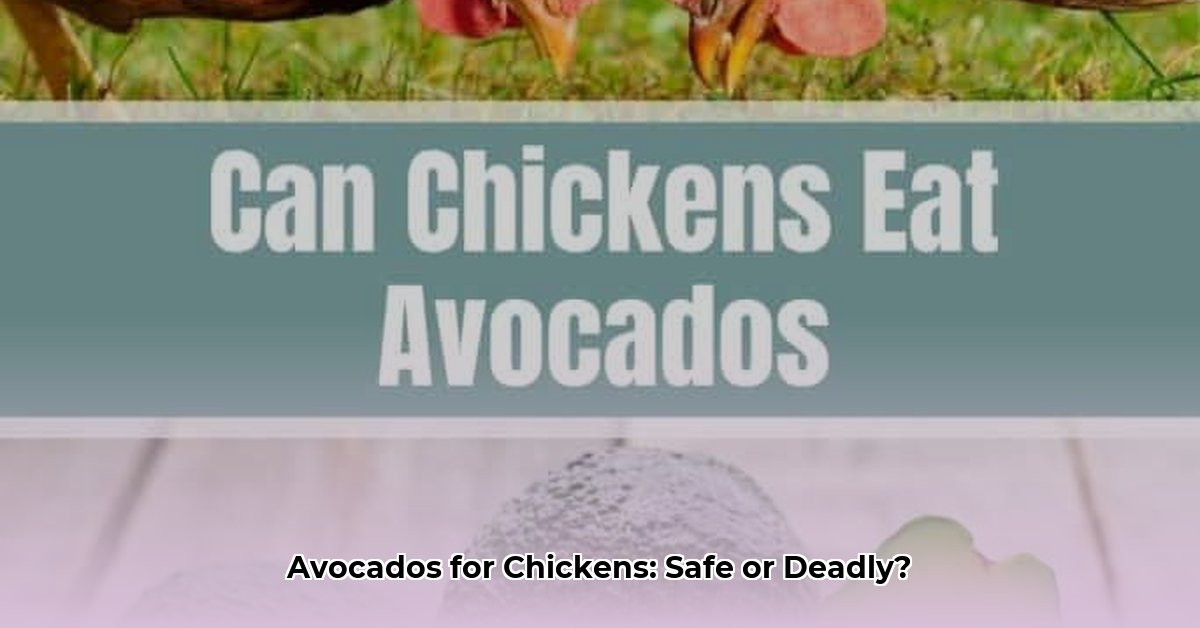Debunking the Avocado Myth: Safe Treats for Your Flock
The internet is rife with warnings about avocados being toxic to chickens. While there’s a grain of truth to this, the reality is more nuanced. This guide will debunk the myth, explaining which parts of the avocado are safe and healthy for your chickens, and which parts should be avoided.
The Avocado: Nutritional Powerhouse or Poultry Poison?
Avocados are packed with healthy fats, vitamins (A, B6, C, E, and K), and minerals like potassium and magnesium. These nutrients can contribute to healthy plumage, strong bones, and potentially boost egg production. However, the skin, pit, leaves, stem, and bark of the avocado tree contain persin, a natural fungicide that can be harmful to chickens. The flesh, however, contains very low levels of persin and is generally safe for chickens to eat in moderation.
Safe vs. Toxic: A Visual Guide to Avocado Parts
Here’s a clear breakdown of which avocado parts are safe and which are not:
| Part of Avocado | Safe for Chickens? |
|---|---|
| Flesh | Yes, in moderation |
| Skin | No |
| Pit | No |
| Leaves | No |
| Stem | No |
| Tree Bark | No |
This image would visually depict the safe (flesh) and unsafe (skin, pit, leaves, stem, bark) parts of an avocado. [Insert image here]
Understanding Persin and Its Effects
Persin is a fungicidal toxin that protects the avocado tree from diseases. While generally safe in the small amounts present in the flesh, higher concentrations in other parts of the avocado can cause health problems for chickens. Symptoms of persin poisoning may include difficulty breathing, lethargy, a purplish comb or wattle, weakness, and decreased egg production. Ongoing research suggests that different breeds might have varying sensitivities to persin, so caution is always advised.
A Step-by-Step Guide to Feeding Avocados Safely
-
Choose Ripe Avocados: Select ripe, soft avocados. Unripe avocados contain higher concentrations of persin.
-
Remove Skin and Pit: Carefully peel away the skin and remove the pit. These parts contain the highest concentration of persin. Dispose of them responsibly, out of reach of your chickens.
-
Portion Control: Avocado is a treat, not a staple. Offer about a tablespoon of avocado flesh per adult chicken, no more than a couple of times a week.
-
Supervise Feeding: Watch your birds while they’re eating avocado to ensure they consume only the flesh and to observe for any unusual reactions.
Nutritional Perks of Avocado Flesh
Avocado flesh offers several nutritional benefits for chickens:
- Healthy Fats: Support healthy feathers and skin.
- Vitamins: Contribute to overall health and well-being.
- Minerals: Essential for strong bones and various bodily functions.
- Fiber: Aids in digestion.
Precautions and Extra Tips
- Tree Placement: Avoid planting avocado trees near the coop to prevent chickens from accessing fallen leaves or other toxic parts.
- Composting: Avocado pits can be composted, but ensure your compost bin is secure and inaccessible to chickens.
- Variety is Key: While avocado can be a healthy treat, it shouldn’t replace a balanced chicken feed. Offer a variety of other healthy treats like leafy greens, vegetables, and fruits (avoiding citrus).
FAQs: Addressing Common Concerns
Q: Is persin poisoning a serious concern?
A: Yes, ingesting large amounts of persin can be dangerous and even fatal for chickens. Always exercise caution and follow the recommended feeding guidelines.
Q: What should I do if I suspect my chicken has persin poisoning?
A: Contact your veterinarian immediately if you observe any symptoms of persin poisoning. Prompt veterinary care is essential.
Q: Can chicks eat avocado?
A: Chicks are particularly vulnerable to the effects of persin. It’s best to avoid feeding them avocado altogether.
What if My Chicken Eats the Wrong Part of an Avocado?
If your chicken ingests the skin, pit, leaves, or any other part of the avocado plant besides the flesh, contact your veterinarian immediately.
Conclusion: Avocado – A Healthy Treat in Moderation
Avocado flesh can be a nutritious and enjoyable treat for your flock when offered responsibly. By following the guidelines outlined in this guide, you can ensure your chickens enjoy the benefits of avocado without the risks associated with persin. Remember, moderation and proper preparation are key to keeping your feathered friends healthy and happy. Keep in mind that research is ongoing, so consult with your veterinarian for specific dietary recommendations for your flock.
- Food Making Kits Bring Easy, Fun Homemade Dishes to Your Kitchen - February 5, 2026
- Cooking Kits Make Mastering New Recipes Fun for Everyone - February 4, 2026
- Leak-Proof Glass Food Containers with Locking Lids Keep Food Fresh - February 3, 2026










